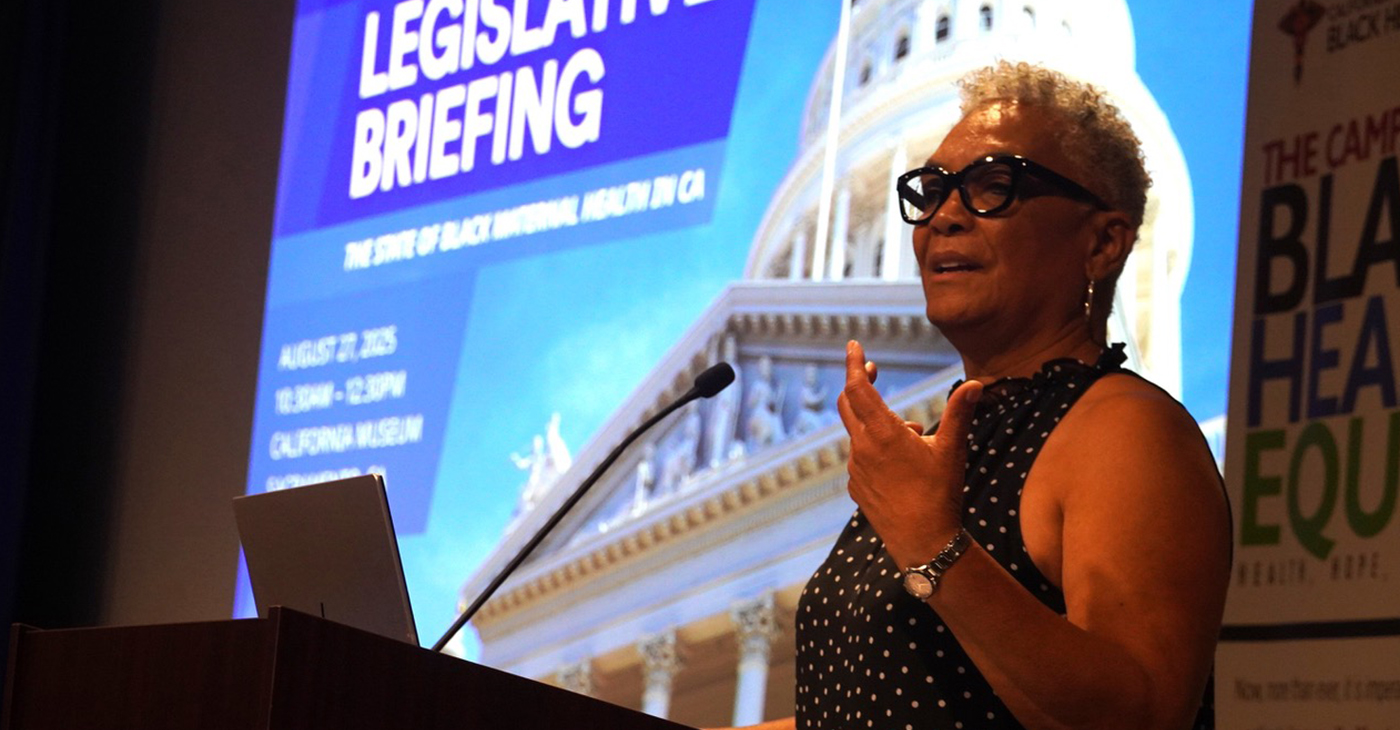Antonio Ray Harvey
Inflation Worries Grow as California Legislature Approves State Budget
During the public comment section of the Assembly Budget Committee hearing on June 13, Adrian Mohammed, an African American representative of the Bay Area Health Initiative spoke about the exclusion of a $500 million proposal to address Black housing and anti-displacement in the Bay Area in the budget the Legislature passed. “We believe that this is an incredibly timely and incredibly necessary ask and we ask that you continue to work with us to get this to come to fruition,” Mohammed told lawmakers.

By Aldon Thomas Stiles and Edward Henderson, California Black Media
Diane Lanette Barkum is an in-home care provider and mom of three. She commutes about 40 minutes every workday between the Riverside County cities of Lake Elsinore, where she lives, and Moreno Valley, where she works.
Over the last few months, Barkum says she has been stressed and scraping by, struggling to balance sharp increases in the cost of gas and food with making enough money to pay for other expenses.
“What worries me most about rising prices is that they’ll continue to rise, making it more difficult for low-income working parents to be able to support their families,” she said.
Terence Henry, who lives in Patterson in the Central Valley, used to drive 77 miles to the Bay Area to make deliveries as an independent contractor. He says the high cost of gas forced him to give up the job late last year and opt for only making local runs.
“It used to cost me about $50 each way to fill up the tank to get to Oakland, San Francisco and other cities,” he said. “It just was not worth it anymore. I was losing money.”
Barkum says she hopes there is relief around the corner for people like her who are working hard, raising children and still unable to make ends meet.
Barkum and Henry are not alone. According to the Public Policy Institute of California, 27% of Californians say jobs, the economy and inflation are their top concern over housing costs and availability (12%) and homelessness (11%).
Across the United States, the inflation rate is 8.6% — up from 4.7% last year, according to the U.S. Department of Labor. And the American Automobile Association reports that the average price per gallon of regular gas in California has risen above $6. Several economists agree that the effects of inflation hit poor and working-class families the hardest.
In Southern California, the inflation rate in Riverside and San Bernardino counties in the Inland Empire has risen to 9.4%, according to the UCLA Anderson School of Management. That number is among the highest of increases in the country.
Last week, the California Legislature approved a record $300 billion-plus budget for the next fiscal year, the largest annual spending plan in the state’s history. The package includes a surplus of close to $100 billion dollars, half of which must be used to fund schools by law.
Included in the budget are plans to spend the other half. So far, legislators have allotted $8 billion in rebates to taxpayers. Another $1.3 billion has been designated for grants to small business and non-profit organizations. Another $600 million has been specified for tax credits to the lowest-income Californians.
While lawmakers – both Democrats and Republicans – and the governor’s office agree that addressing spiraling inflation is urgent, they have not reached agreement on how to provide relief to struggling families.
Anthony York, Newsom’s senior advisor for communications, said in a statement that the governor still wants “more immediate, direct relief to help millions more families with rising gas, groceries and rent prices.”
At the federal level, U.S. Federal Reserve Chairman Jerome Powell approved a three-quarter (0.75) percentage point rate hike — the highest single percentage rate increase since 2008.
“African American-owned businesses and families are experiencing the damaging effects of inflation including the current interest rate increase instituted by the Federal Reserve Board.
“It is important for financial institutions to work with Black-owned businesses and their families to help navigate the rising cost of capital needed to operate and sustain all businesses,” said Timothy Alan Simon, board chair of the California African American Chamber of Commerce.
By statute, Newsom has until June 30 to veto the legislators’ budget bill or sign it into law.
If the governor approves the budget, it will take effect July 1, the beginning of the 2022-23 fiscal year. However, negotiations are expected to continue through the end of August as lawmakers hammer out final details.
During the public comment section of the Assembly Budget Committee hearing on June 13, Adrian Mohammed, an African American representative of the Bay Area Health Initiative spoke about the exclusion of a $500 million proposal to address Black housing and anti-displacement in the Bay Area in the budget the Legislature passed.
“We believe that this is an incredibly timely and incredibly necessary ask and we ask that you continue to work with us to get this to come to fruition,” Mohammed told lawmakers.
On June 15, Republican leaders held a rally at the State Capitol blasting their Democratic colleagues for their inaction on addressing the high cost of gas.
“Legislative Republicans are gathered here to remind Californians that it has been 100 days since the governor and the Democrats here in Sacramento promised California consumers relief on gas prices. One hundred days is far too long,” said Assemblymember James Gallagher (R-Yuba City). After 100 days, we are still waiting with no relief in sight. We need action now. We’ve been calling since January to suspend the gas tax.”
Senate Pro Tem Toni Atkins (D-San Diego) said the state’s wealth needs to work for hardworking Californians. She pointed to a provision in the budget that provides $200 rebates to working families earning up to $250,000 a year and $125,000 for single filers.
“We are focused on providing struggling families the relief they need to weather rising costs of fuel and groceries, investing ongoing funding in core programs and services, funding one-time infrastructure projects that will keep California moving for years to come,” she said.
Assembly Speaker Anthony Rendon (D-Lakewood) echoed Atkin’s optimism.
“We share a firm belief that our state is strongest when it cares for the weakest among us,” said Rendon. “Our budget proposal continues to lay the groundwork with infrastructure and other investments for future prosperity.”
Antonio Ray Harvey
$96 Million Allocated So Far to Black-Owned Firms as High-Speed Rail Project Expands Jobs, Boost Local Economies
Sen. Lola Smallwood-Cuevas (D-Los Angeles), a member of the California Legislative Black Caucus (CLBC) and Chair of the Senate Committee on Labor, Public Employment and Retirement, says the rail project “is exactly the kind of investment” California needs.

By Antonio Ray Harvey, California Black Media
As of May 31, the most recent data from the California High-Speed Rail Authority shows that 47 African American-owned firms are participating in the project as Disadvantaged Business Enterprises (DBEs).
A total of 936 Certified Small businesses are working on the high-speed rail program statewide, representatives of the high-speed rail project say.
The number of Black-owned DBE firms (5.2%) accounts for $96 million of the $1.136 billion allocated to minority firms thus far.
Sen. Lola Smallwood-Cuevas (D-Los Angeles), a member of the California Legislative Black Caucus (CLBC) and Chair of the Senate Committee on Labor, Public Employment and Retirement, says the rail project “is exactly the kind of investment” California needs.
Smallwood-Cuevas, speaking in Aug. 25 at the State Capitol Swing Space Annex — along with a coalition of Democratic state legislators and union leaders — provided an update on the California High-Speed Rail project and its efforts to employ people from the Black community and businesses.
“It builds a cleaner, more connected California while creating thousands of union jobs,” said Smallwood-Cuevas. “And we must ensure workforce equity, with pathways that open doors for workers who too often have been left out of good-paying careers.”
The remaining DBE minority-owned firms received the following amounts:
- Asian Subcontinent: 24 firms received approximately $65 million
- Asian-Pacific Islander: 52 firms received approximately $86 million
- Native American: 6 firms received approximately $39 million
- Hispanic/Latino: an unspecified number of DBE businesses received approximately $848 million
There are currently 328 certified DBEs participating in the project, according to the California High Speed Authority. The multi-billion-dollar project is billed to be committed to small, disabled, disadvantaged, and diverse businesses playing a major role in building the statewide high-speed rail project.
“As a Central Valley native, I know firsthand how transformative high-speed rail will be for our communities,” stated Assemblymember Lori D. Wilson (D-Suisun City) a member of the CLBC and Chair of the Assembly Transportation Committee.
“Stable and sustained funding is essential to delivering this project and fulfilling the promise made to voters.”
The news conference was hosted by Senate Transportation Chair, Sen. Dave Cortese (D-San Jose), who was promoting Senate Bill (SB) 545. He and the California High-Speed Rail Authority (CHSRA) urged the Legislature to commit to a steady, annual investment from a cap-and-trade program to fund the high-speed rail project.
Dr. Melanie Okoro, the Principal and Chief Executive Officer of Eco-Alpha, attended the briefing. Eco-Alpha is a Sacramento-headquartered small, women-owned, minority-certified firm.
The company, not classified as a DBE, earned its status as a certified small business and a certified women-minority small business through the California Public Utilities Commission (CPUC) and the Department of General Services (DGS). The certification allowed Eco-Alpha to be featured by CHSRA as a small business working on the project.
The Black-owned firm provides engineering and environmental services to the California High-Speed Rail project, primarily focused on facilities operation and Maintenance.
Okoro said laborers are not the only workers benefiting from the project. Professionals of color in engineering, with specialized knowledge and problem-solving skills to design, build, and maintain a wide array of structures, systems, and products, are looking forward to these “great opportunities.”
Activism
Sacramento: Lawmakers Hear From Health Advocates on “State of Black Maternal Health”
Participants highlighted several past and current bills going through the state Legislature that focus on improving maternal health equity. The proposals address systemic inequities to improve the healthcare experiences of Black women during pregnancy, labor, and postpartum.

By Antonio Ray Harvey, California Black Media
Adjoa Jones is a Los Angeles-based health and community leader who has dedicated her career to advocating for equitable birth outcomes for Black mothers and infants.
Participating in a legislative briefing hosted by the California Black Health Network (CBHN) on Aug. 27, Jones shared stories that shed light on the disproportionately high rate of pregnancy-related complications and deaths among Black women.
Two Black women in Southern California, Jones says, suddenly passed away after giving birth. From Jones’s perspective, those maternal mortalities could have been prevented.
“I come to you speaking from the voices of our community. From the stories of two unforgettable mothers, but it really speaks to the most preventable tragedies,” said, Jones, who is the Director of African American Infant and Maternal Mortality Prevention Initiative at the L.A. County Department.
“It’s not just impacting California, but our nation far and wide,” Jones added during the event titled “The State of Black Maternal Health” and held at the California State Museum in Sacramento.
Participants highlighted several past and current bills going through the state Legislature that focus on improving maternal health equity. The proposals address systemic inequities to improve the healthcare experiences of Black women during pregnancy, labor, and postpartum.
Panelists included Sandra Poole, Health Policy advocate for the Western Center on Law and Poverty, and Brittany Chambers, Associate Professor for the Department of Human Ecology at the University of California at Davis.
Other panelists were Palav Babaria, Deputy Director for the California Department of Health Care Services, and Zea Malawa, Director of Expecting Justice.
Rhonda Smith, the Executive Director of CBHN, served as the host and moderator of the briefing.
“There are amazing and incredible women who are doing amazing work here in the state,” Smith said of the panelists who discussed potential policy solutions and accountability.
During Jones’ presentation, she shared the tragic stories of two women. One was April Valentine, who died on Jan. 10, 2023, after giving birth at Centinela Hospital Medical Center in Inglewood.
According to reports, Valentine died from a blood clot, a pulmonary embolism, that formed in her leg and circulated to her lung. A well-known complication during pregnancy. Valentine’s family members said her condition was preventable, and they filed a wrongful-death claim.
The second woman, 32-year-old Briget Cromer, died in 2023 at California Hospital Medical Center, hours after giving birth to her fifth child. Her family believes her death was due to medical negligence.
Her family’s legal team filed a formal complaint with the U.S. Department of Health and Human Services (USDHH) alleging systemic racial bias in care.
According to the California Department of Public Health, Black women are more likely than their counterparts to die during pregnancy. They represent 5% pregnancies in the state but account for 21% of pregnancy-related deaths.
“We’re doing all that we can to ensure that pregnancy is uplifted (and) pregnancy is a place that’s where folks can enjoy the journey, Jones said.
Sen. Akilah Weber Pierson (D-San Diego), an obstetrician-gynecologist, was the keynote speaker.
“Here in California, we tragically lose another mother due to pregnancy-related complications every five days,” Weber Pierson said. “Here and nationally, Black mothers are three to four times likely to be one of those mothers lost. That’s coming from 40% of maternal deaths.”
Antonio Ray Harvey
Air Quality Board Rejects Two Rules Written to Ban Gas Water Heaters and Furnaces
The proposal would have affected 17 million residents in Southern California, requiring businesses, homeowners, and renters to convert to electric units. “We’ve gone through six months, and we’ve made a decision today,” said SCAQMD board member Carlos Rodriguez. “It’s time to move forward with what’s next on our policy agenda.”

By Antonio Ray Harvey
California Black Media
Two proposed rules to eliminate the usage of gas water heaters and furnaces by the South Coast Air Quality Management District (SCAQMD) in Southern California were rejected by the Governing Board on June 6.
Energy policy analysts say the board’s decision has broader implications for the state.
With a 7-5 vote, the board decided not to amend Rules 1111 and 1121 at the meeting held in Diamond Bar in L.A. County.
The proposal would have affected 17 million residents in Southern California, requiring businesses, homeowners, and renters to convert to electric units.
“We’ve gone through six months, and we’ve made a decision today,” said SCAQMD board member Carlos Rodriguez. “It’s time to move forward with what’s next on our policy agenda.”
The AQMD governing board is a 13-member body responsible for setting air quality policies and regulations within the South Coast Air Basin, which covers areas in four counties: Riverside County, Orange County, San Bernardino County and parts of Los Angeles County.
The board is made up of representatives from various elected offices within the region, along with members who are appointed by the Governor, Speaker of the Assembly, and Senate Rules Committee.
Holly J. Mitchell, who serves as a County Supervisor for the Second District of Los Angeles County, is a SCAQMD board member. She supported the amendments, but respected the board’s final decision, stating it was a “compromise.”
“In my policymaking experience, if you can come up with amended language that everyone finds some fault with, you’ve probably threaded the needle as best as you can,” Mitchell said before the vote. “What I am not okay with is serving on AQMD is making no decision. Why be here? We have a responsibility to do all that we can to get us on a path to cleaner air.”
The rules proposed by AQMD, Rule 1111 and Rule 1121, aim to reduce nitrogen oxide (NOx) emissions from natural gas-fired furnaces and water heaters.
Rule 1111 and Rule 1121 were designed to control air pollution, particularly emissions of nitrogen oxides (NOx).
Two days before the Governing Board’s vote, gubernatorial candidate Antonio Villaraigosa asked SCAQMD to reject the two rules.
Villaraigosa expressed his concerns during a Zoom call with the Cost of Living Council, a Southern California organization that also opposes the rules. Villaraigosa said the regulations are difficult to understand.
“Let me be clear, I’ve been a big supporter of AQMD over the decades. I have been a believer and a fighter on the issue of climate change my entire life,” Villaraigosa said. “But there is no question that what is going on now just doesn’t make sense. We are engaging in regulations that are put on the backs of working families, small businesses, and the middle class, and we don’t have the grid for all this.”
Rules 1111 and 1121 would also establish manufacturer requirements for the sale of space and water heating units that meet low-NOx and zero-NOx emission standards that change over time, according to SCAQMD.
The requirements also include a mitigation fee for NOx-emitting units, with an option to pay a higher mitigation fee if manufacturers sell more low-NOx water heating and space units.
Proponents of the proposed rules say the fees are designed to incentivize actions that reduce emissions.
-

 Activism4 weeks ago
Activism4 weeks agoOakland Post: Week of November 12 – 18, 2025
-

 Activism4 weeks ago
Activism4 weeks agoIN MEMORIAM: William ‘Bill’ Patterson, 94
-

 Activism4 weeks ago
Activism4 weeks agoHow Charles R. Drew University Navigated More Than $20 Million in Fed Cuts – Still Prioritizing Students and Community Health
-

 Bay Area4 weeks ago
Bay Area4 weeks agoNo Justice in the Justice System
-

 #NNPA BlackPress3 weeks ago
#NNPA BlackPress3 weeks agoBeyoncé and Jay-Z make rare public appearance with Lewis Hamilton at Las Vegas Grand Prix
-

 Activism3 weeks ago
Activism3 weeks agoOakland Post: Week of November 19 – 25, 2025
-

 #NNPA BlackPress3 weeks ago
#NNPA BlackPress3 weeks agoLewis Hamilton set to start LAST in Saturday Night’s Las Vegas Grand Prix
-

 #NNPA BlackPress2 weeks ago
#NNPA BlackPress2 weeks agoLIHEAP Funds Released After Weeks of Delay as States and the District Rush to Protect Households from the Cold



















































